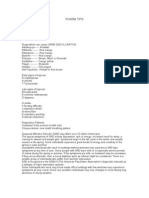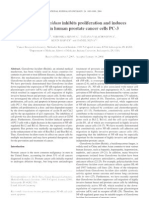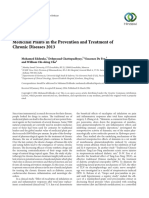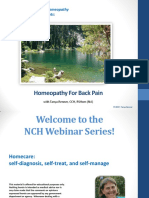0 ratings0% found this document useful (0 votes)
4K viewsQuercetin SpecSheet
Quercetin SpecSheet
Uploaded by
drmauraQuercetin has been shown in experimental studies to have numerous effects on the body. It is found in many often-consumed foods, including apple, onion, tea, berries, and brassica vegetables. Individuals with very low intakes of flavonoids are at higher risk for heart disease.
Copyright:
Attribution Non-Commercial (BY-NC)
Available Formats
Download as PDF, TXT or read online from Scribd
Quercetin SpecSheet
Quercetin SpecSheet
Uploaded by
drmaura0 ratings0% found this document useful (0 votes)
4K views2 pagesQuercetin has been shown in experimental studies to have numerous effects on the body. It is found in many often-consumed foods, including apple, onion, tea, berries, and brassica vegetables. Individuals with very low intakes of flavonoids are at higher risk for heart disease.
Original Title
Quercetin_SpecSheet
Copyright
© Attribution Non-Commercial (BY-NC)
Available Formats
PDF, TXT or read online from Scribd
Share this document
Did you find this document useful?
Is this content inappropriate?
Quercetin has been shown in experimental studies to have numerous effects on the body. It is found in many often-consumed foods, including apple, onion, tea, berries, and brassica vegetables. Individuals with very low intakes of flavonoids are at higher risk for heart disease.
Copyright:
Attribution Non-Commercial (BY-NC)
Available Formats
Download as PDF, TXT or read online from Scribd
Download as pdf or txt
0 ratings0% found this document useful (0 votes)
4K views2 pagesQuercetin SpecSheet
Quercetin SpecSheet
Uploaded by
drmauraQuercetin has been shown in experimental studies to have numerous effects on the body. It is found in many often-consumed foods, including apple, onion, tea, berries, and brassica vegetables. Individuals with very low intakes of flavonoids are at higher risk for heart disease.
Copyright:
Attribution Non-Commercial (BY-NC)
Available Formats
Download as PDF, TXT or read online from Scribd
Download as pdf or txt
You are on page 1of 2
D’ADAMO
NAP PROFESSIONAL SERVICES
Quercetin Plus™ (Quercetin - Bromelain Complex)
90 Veggiecaps per bottle.
Suggested retail price: 21.95 vessels, prevent easy bruising, and support the immune
Quercetin is widely distributed in the plant system—all of which are beneficial to individuals with
kingdom and has been shown in experimental diabetes.
studies to have numerous effects on the body. • Heart disease: Individuals with very low intakes of flavonoids
It is found in many often-consumed foods, are at higher risk for heart disease.
including apple, onion, tea, berries, and
• Infection: Quercetin may control the spread of certain viruses
brassica vegetables, as well as many seeds,
within the body.
nuts, flowers, barks, and leaves. It is also
found in medicinal botanicals and is often a • Aldose reductase inhibitor
major component of the medicinal activity of the plant. Quercetin • Rheumatoid arthritis: Quercetin may help reduce tissue
appears to have many beneficial effects on human health, including destruction.
cardiovascular protection, anti-cancer activity, anti-ulcer effects,
Quercetin’s anti-inflammatory activity appears to be due to its
anti-allergy activity, cataract prevention, antiviral activity, and
antioxidant and inhibitory effects on inflammation-producing
anti-inflammatory effects. Quercetin is extensively employed in
enzymes (cyclooxygenase, lipoxygenase) and the subsequent
the Protocols section of the Complete Blood Type Encyclopedia.
inhibition of inflammatory mediators, including leukotrienes
Product History and prostaglandins. Inhibition of histamine release by mast cells
This product was introduced by NAP in 2002 after first being and basophils also contributes to quercetin’s anti-inflammatory
specifically designed for use in my clinic. activity.
Quercetin’s mast-cell-stabilizing effects make it a clear choice
Description/Background
for use in preventing histamine release in allergy cases.
Quercetin is widely distributed in the plant kingdom and is the Quercetin’s cardiovascular effects center on its antioxidant and
most abundant of the flavonoid molecules. It is found in many anti-inflammatory activity. In one study, the risk of heart disease
often consumed foods, including apple, onion, tea, berries, and mortality decreased significantly as flavonoid intake increased.
brassica vegetables, as well as many seeds, nuts, flowers, barks, Interestingly, the flavonoid-containing foods most commonly
and leaves. eaten in this study contain a high amount of quercetin (tea, onions,
It is also found in medicinal botanicals and is often a major apples). Quercetin is indicated in any inflammatory condition,
component of the medicinal activity of the plant, and has been as it inhibits the formation of the inflammatory mediators
shown in experimental studies to have numerous effects on the prostaglandins and leukotrienes, as well as histamine release.
body. Quercetin appears to have many beneficial effects on human Animal studies have shown quercetin to be protective of gastric
health, including cardiovascular protection, anti-cancer activity, ulceration and an interesting aspect of quercetin’s anti-ulcer effect
anti-ulcer effects, anti-allergy activity, cataract prevention, is that it has been shown to inhibit growth of Helicobacter pylori
antiviral activity, and anti-inflammatory effects. in a dose-dependent manner.
Actions and Indications Quercetin may help treat or even prevent prostate cancer by
• Allergies, asthma, and hives: Quercetin may inhibit histamine blocking male hormones that encourage the growth of prostate
release from basophils (a type of white blood cell) and mast cancer cells, according to preliminary laboratory research at the
cells (large cells in connective tissue). Mayo Clinic. In another study, men with an inflamed prostate
(prostatitis) reported reduced urinary symptoms when they took
• Cancer: Quercetin may be beneficial in the treatment of skin quercetin. Quercetin has been investigated in a number of animal
cancer, and may have anti-tumor effects in other cancers, models and human cancer cell lines, and has been found to have
such as ovarian cancer. antiproliferative effects. It may also increase the effectiveness of
• Canker sores: Quercetin may reduce the frequency of mouth chemotherapeutic agents. More clinically-oriented research needs
sores and produce mild symptomatic relief. to be done in this area to discover effective dosage ranges and
• Diabetes mellitus: Quercetin may help prevent cataracts, protocols.
retinal disorders, nerve diseases, and other complications Quercetin’s aldose reductase-inhibiting properties may make it a
of diabetes. Flavonoids, including quercetin, also promote useful addition to diabetic nutritional supplementation, to prevent
insulin secretion, increase vitamin C levels, protect blood cataract and neurovascular complications.
Synergistic Products 19. Caltagirone S, Raneletti FO, Rinelli A, et al. Interaction with type II estrogen
binding sites and antiproliferative activity of tamoxifen and quercetin in
• Rekon Pro, Helix Plus (Malignancies) human non-small-cell lung cancer. Am J Resp Cell Mol Biol 1997;17:51-59.
• Glycoscia (diabetic management) 20. Hertog MG, Feskens EJ, Hollman PC, et al. Dietary antioxidant flavonoids
and risk of coronary heart disease: the Zutphen Elderly Study. Lancet
Dosage 1993;342:1007-1011. Pace-Asciak CR, Hahn S, Diamandis EP, et al. The
An oral dose of 300-600 mg two times per day is typically used in red wine phenolics trans-resveratrol and quercetin block human platelet
aggregation and eicosanoid synthesis: implications for protection against
clinical practice. coronary heart disease. Clin Chim Acta 1995;235:207-219
References 21. Alarcón de la Lastra C, Martín MJ, Motilva V. Antiulcer and gastroprotective
1. 1. Stavric B. Quercetin in our diet: from potent mutagen to probable effects of quercetin: a gross and histologic study. Pharmacology 1994;48:56-
anticarcinogen. Clin Biochem 1994;27:245-248. 62.
2. Kim HP, Mani I, Ziboh VA. Effects of naturally-occurring flavonoids and
biflavonoids on epidermal cyclooxygenase from guinea pigs. Prostaglandins
Leukot Essent Fatty Acids 1998;58:17-24. Model: NP031
3. Chang WS, Lee YJ, Lu FJ, Chiang HC. Inhibitory effects of flavonoids on * Manufactured by: Genoma Nutritionals
xanthine oxidase. Anticancer Res 1993;13:2165-2170.
4. Kaul TN, Middleton E Jr, Ogra PL. Antiviral effect of flavonoids on human
viruses. J Med Virol 1985;15: 71-79.
5. DeWhalley CV, Rankin JF, Rankin SM, et al. Flavonoids inhibit the oxidative
modification of low density lipoproteins. Biochem Pharmacol 1990;39:1743-
1749.
6. Chen YT, Zheng RL, Jia ZJ, Ju Y. Flavonoids as superoxide scavengers and
antioxidants. Free Radic Biol Med 1990;9:19-21.
7. Skaper SD, Fabris M, Ferrari V, et al. Quercetin protects cutaneous
tissueassociated cell types including sensory neurons from oxidative stress
induced by glutathione depletion: cooperative effects of ascorbic acid. Free
Radic Biol Med 1997;22:669-678
8. Ragazzi E, Tubaro A, et al. Anti-inflammatory activity of benzopyrones
that are inhibitors of cyclo- and lipo-oxygenase. Pharmacol Res Commun
1988;20:S91-S94.
9. Hertog MGL, Hollman PCH. potential health effects of the dietary flavonol
quercetin. Eur J Clin Nutr 1996;50:63-71.
10. Bronner C, Landry Y. Kinetics of the inhibitory effect of flavonoids on
histamine secretion from mast cells. Agents Actions 1985;16:147-151.
11. Chaudry PS, Cabera J, Juliani HR, Varma SD. Inhibition of human lens
aldose reductase by flavonoids, sulindac, and indomethacin. Biochem
Pharmacol 1983;32:1995-1998.
12. Yoshida M, Sakai T, Hosokawa N, et al. The effect of quercetin on cell
cycle progression and growth of human gastric cancer cells. FEBS Letters
1990;260:10-13.
13. Scambia G, Raneletti FO, Panici PB, et al. Quercetin induces type-II
estrogenbinding sites in estrogen-receptor-negative (MDA-MB231) and
estrogenreceptor-positive (MCF-7) human breast-cancer cell lines. Int J
Cancer 1993;54:462-466.
14. Scambia G, Raneletti FO, Panici PB, et al. Quercetin inhibits the growth
of a multidrug-resistant estrogen-receptor-negative MCF-7 human breast-
cancer cell line expressing type II estrogen-binding sites. Cancer Chemother
Pharmacol1991;28:255-258.
15. Castillo MH, Perkins E, Campbell JH. The effects of the bioflavonoid
quercetin on squamous cell carcinoma of head and neck origin. Am J Surg
1989;158:351-355.
16. Singhal RL, Yeh YA, Prajda N, et al. Quercetin down-regulates signal
transduction in human breast carcinoma cells. Biochem Biophys Res Comm
1995;208:425-431.
17. Gugler R, Leschik M, Dengler HJ. Disposition of quercetin in man after
single oral and intravenous doses. Eur J Clin Pharmacol 1975;9:229-234.
18. Scambia G, Raneletti FO, Panici PB, et al. Synergistic antiproliferative
activity of quercetin and cisplatin on ovarian cancer cell growth. Anticancer
Drugs 1990;1:45-48. Mizui T, Sato H, Hirose F, Doteuchi M. Effect of
antiperoxidative drugs on gastric damage induced by ethanol in rats. Life
Sci 1987;41:755-763.
copyright © 2010, North American Pharmacal, Inc. All Rights Reserved. REV:051810:wst
These statements have not been evaluated by the FDA (U.S. Food & Drug Administration).
Our products are not intended to diagnose, cure or prevent any disease. If a condition persists, please contact your physician.
North American Pharmacal, Inc. • 213 Danbury Road, Wilton, CT 06897 Toll Free USA (877) 226-8973 or (203) 761-0042 • www.4yourtype.com
You might also like
- The Plight of The Parentified ChildDocument2 pagesThe Plight of The Parentified Childeric parlNo ratings yet
- Newsletter Spring 2006Document4 pagesNewsletter Spring 2006786lailaNo ratings yet
- Natural Strategies for Cancer PatientsFrom EverandNatural Strategies for Cancer PatientsRating: 4 out of 5 stars4/5 (2)
- Etnofarmakologi Anti Kanker PDFDocument11 pagesEtnofarmakologi Anti Kanker PDFAlsya UtamiNo ratings yet
- Nclex Pharm TipsDocument39 pagesNclex Pharm TipsPohs Enilno100% (18)
- Cold Weather Smart Card Mar 2013Document20 pagesCold Weather Smart Card Mar 2013100003No ratings yet
- Applications of ResveratrolDocument32 pagesApplications of ResveratrolMihai CindeaNo ratings yet
- NutraceuticalsforcancerDocument1 pageNutraceuticalsforcancerSania AfreenNo ratings yet
- June2020 JBTRflavonoidsreviewDocument9 pagesJune2020 JBTRflavonoidsreviewCici Faradita SuliNo ratings yet
- Pterostilbene Monograph: OH H CODocument5 pagesPterostilbene Monograph: OH H COpterostilbene100% (1)
- MycomedicinalsDocument51 pagesMycomedicinalslightningice100% (1)
- Pharmacognosy and Phytochemistry II Assignment Rani KumariDocument12 pagesPharmacognosy and Phytochemistry II Assignment Rani KumariRani KumariNo ratings yet
- Polyphenols and Cancer A ReviewDocument7 pagesPolyphenols and Cancer A ReviewWiuuuNo ratings yet
- Ko, J.-H., Sethi, G., Um, J.-Y., Shanmugam, M. K., Arfuso, F., Kumar, A. P., Ahn, K. S. (2017) - The Role of Resveratrol in Cancer Therapy.Document36 pagesKo, J.-H., Sethi, G., Um, J.-Y., Shanmugam, M. K., Arfuso, F., Kumar, A. P., Ahn, K. S. (2017) - The Role of Resveratrol in Cancer Therapy.Luis ReyNo ratings yet
- Broussonetia Luzonica Leaves Extract On Lowering Cholesterol Levels Utilizing Ambient Ionization Mass Spectrometry (AIMS)Document6 pagesBroussonetia Luzonica Leaves Extract On Lowering Cholesterol Levels Utilizing Ambient Ionization Mass Spectrometry (AIMS)John Carl SalavarriaNo ratings yet
- Botany ProjectDocument25 pagesBotany ProjectSunil ShekharNo ratings yet
- Nutraceutical Lecture 3Document34 pagesNutraceutical Lecture 3ESUFIYAN ALWSABINo ratings yet
- Molecules 27 06425 v2Document18 pagesMolecules 27 06425 v2AUDITORIA MEDICANo ratings yet
- Molecules 28 01352 With CoverDocument21 pagesMolecules 28 01352 With CoveracheikhrouhouNo ratings yet
- Minunata Cerneala Violeta A PlantelorDocument14 pagesMinunata Cerneala Violeta A Plantelorstamatin lilianaNo ratings yet
- Withania Somnifera and Its Potential Role: Ancient Medicine, Modern Use: in Integrative OncologyDocument9 pagesWithania Somnifera and Its Potential Role: Ancient Medicine, Modern Use: in Integrative OncologyvakilNo ratings yet
- Anticancer and Overcoming Multidrug Resistance Activities of Potential PhytochemicalsDocument11 pagesAnticancer and Overcoming Multidrug Resistance Activities of Potential PhytochemicalsScivision PublishersNo ratings yet
- New Anticancer Agents: Recent Developments in Tumor Therapy: Nticancer ESEARCH 32: 2999-3006 (2012)Document7 pagesNew Anticancer Agents: Recent Developments in Tumor Therapy: Nticancer ESEARCH 32: 2999-3006 (2012)MaraNo ratings yet
- Lampe 1999Document16 pagesLampe 1999Phúc TrầnNo ratings yet
- Daily Quercetin Supplementation Dose Dependently Increases Plasma Quercetin Concentration in Healthy HumanDocument7 pagesDaily Quercetin Supplementation Dose Dependently Increases Plasma Quercetin Concentration in Healthy HumanNguyen Thuy100% (1)
- Cancer Prevention and Treatment With ResDocument11 pagesCancer Prevention and Treatment With ResSrishti Agarwal100% (1)
- Antioxidants in Oral Mucosal LesionsDocument4 pagesAntioxidants in Oral Mucosal LesionsVsh SngNo ratings yet
- Cazal Et Al 2010Document8 pagesCazal Et Al 2010Intan RahmayantiNo ratings yet
- Role of Herbals in Cancer Management: Sanjar Alam, Deepti Katiyar, Richa Goel, Amita Vats, Ashu MittalDocument6 pagesRole of Herbals in Cancer Management: Sanjar Alam, Deepti Katiyar, Richa Goel, Amita Vats, Ashu MittalColor BlackNo ratings yet
- Jiang, Z., Chen, K., Cheng, L., Yan, B., Qian, W., Cao, J., ... Yang, W. (2017) - Resveratrol y Tratamiento Del Cáncer - Actualizaciones.Document11 pagesJiang, Z., Chen, K., Cheng, L., Yan, B., Qian, W., Cao, J., ... Yang, W. (2017) - Resveratrol y Tratamiento Del Cáncer - Actualizaciones.Luis ReyNo ratings yet
- Flavonoides PDFDocument18 pagesFlavonoides PDFmekaekNo ratings yet
- Antineoplastic Agents ReportDocument3 pagesAntineoplastic Agents ReportMegan Rose MontillaNo ratings yet
- Estrategias CaDocument14 pagesEstrategias CaLuis Armando BuenaventuraNo ratings yet
- Antioxidants in Prevention of Oral CancerDocument4 pagesAntioxidants in Prevention of Oral CancerIJAR JOURNALNo ratings yet
- Overviews of Biological Importance of Quercetin: A Bioactive FlavonoidDocument6 pagesOverviews of Biological Importance of Quercetin: A Bioactive FlavonoidDea FauziyyantiNo ratings yet
- An Overview of Phyto Chemical and Pharmacological Activities ofDocument9 pagesAn Overview of Phyto Chemical and Pharmacological Activities ofiman14No ratings yet
- ReishiMax Clinical StudyDocument7 pagesReishiMax Clinical StudynsagelocspaNo ratings yet
- Elkashty 2021Document20 pagesElkashty 2021Juan Santiago GrassanoNo ratings yet
- Exploring Beneficial Properties of Haskap Berry LeafDocument22 pagesExploring Beneficial Properties of Haskap Berry LeafHUSEYIN CELIKNo ratings yet
- From Traditional Ayurvedic Medicine To MDocument32 pagesFrom Traditional Ayurvedic Medicine To MTharindu UpekaNo ratings yet
- Actin Cytoskeleton Reconstitution in MCF-7 Breast Cancer Cells Initiated by A Native Ax Root ExtractDocument15 pagesActin Cytoskeleton Reconstitution in MCF-7 Breast Cancer Cells Initiated by A Native Ax Root ExtractgpaivNo ratings yet
- Biologia PlantelorDocument23 pagesBiologia PlantelorCristina Teodora BerbecaruNo ratings yet
- 5 Foods That Destroy TumorsDocument3 pages5 Foods That Destroy TumorsnlutskerNo ratings yet
- 15+cancer Fighting+Foods+That+Enhance+Detox+&+Rejuvenation+Document17 pages15+cancer Fighting+Foods+That+Enhance+Detox+&+Rejuvenation+Mirta Brajkovic KurkutovicNo ratings yet
- Bawang PutihDocument2 pagesBawang PutihErdarhNo ratings yet
- Surh 1999Document23 pagesSurh 1999It's RohanNo ratings yet
- 1 s2.0 S0011393X2100014X MainDocument7 pages1 s2.0 S0011393X2100014X Mainmitu afrinNo ratings yet
- Effect of Low Dose Quercetin and CancerDocument21 pagesEffect of Low Dose Quercetin and CancerMetcher Maa AkhiNo ratings yet
- HUQ2014Document5 pagesHUQ2014MonikaNo ratings yet
- Mycomedicinals For CancerDocument5 pagesMycomedicinals For CancerKim Lee BrookNo ratings yet
- ANTICANCER DRUGS (Compatibility Mode)Document70 pagesANTICANCER DRUGS (Compatibility Mode)EyasuNo ratings yet
- Phytochemicals in Foods: Elisha Gay C. Hidalgo, RNDDocument49 pagesPhytochemicals in Foods: Elisha Gay C. Hidalgo, RNDinkpen56789100% (1)
- CURCUMINpdfDocument7 pagesCURCUMINpdfDede MulyamanNo ratings yet
- Alarcon 2007Document5 pagesAlarcon 2007Daniel Juarez SerranoNo ratings yet
- Nutrients 08 00731Document32 pagesNutrients 08 00731julianNo ratings yet
- ResveratrolDocument5 pagesResveratrolBurlucFlorinNo ratings yet
- 2020 A Review of QuercetinDocument7 pages2020 A Review of QuercetinSrikanth TangiralaNo ratings yet
- PT. LapiDocument21 pagesPT. LapiAnton PahrudinNo ratings yet
- New Gen Dr. Vita OPC Double Layer Tablet 20220727Document26 pagesNew Gen Dr. Vita OPC Double Layer Tablet 20220727Vicky AquinoNo ratings yet
- Effects and Mechanisms of Resveratrol On Aging and Age - Related DiseasesDocument15 pagesEffects and Mechanisms of Resveratrol On Aging and Age - Related DiseasesAna MariaNo ratings yet
- PhyllanthusDocument3 pagesPhyllanthusKrithika VenkateshNo ratings yet
- eCAM Edi 20007 PDFDocument4 pageseCAM Edi 20007 PDFM AshokNo ratings yet
- Overview of Nutraceuticals in The Prevention of Diseases: International Journal of Clinical Science and Medical ResearchDocument8 pagesOverview of Nutraceuticals in The Prevention of Diseases: International Journal of Clinical Science and Medical Researchkalinca marizyNo ratings yet
- Drugs of Dependence: BY DR P.N. KarimiDocument73 pagesDrugs of Dependence: BY DR P.N. KarimiGerald Limo Arap ChebiiNo ratings yet
- (13142143 - Folia Medica) Subgingival Microbiota During Formation of Permanent DentitionDocument7 pages(13142143 - Folia Medica) Subgingival Microbiota During Formation of Permanent DentitionfghdhmdkhNo ratings yet
- 1 PBDocument8 pages1 PBMadya WicaksonoNo ratings yet
- EITK Unit-4 (Maharishi Shushruta)Document5 pagesEITK Unit-4 (Maharishi Shushruta)CHETANNo ratings yet
- In-Depth Review: Helbert Rondon-Berrios and Tomas BerlDocument11 pagesIn-Depth Review: Helbert Rondon-Berrios and Tomas BerlMuzaffar MehdiNo ratings yet
- Kriya Sharir Proceeding - VayasthapnamDocument250 pagesKriya Sharir Proceeding - VayasthapnamNeet NightsNo ratings yet
- Semi Detailed Lesson Plan in ScienceDocument6 pagesSemi Detailed Lesson Plan in ScienceJoshua Dela CruzNo ratings yet
- ByeByeBackPain TanyaRenner 03-06-2017Document49 pagesByeByeBackPain TanyaRenner 03-06-2017Yo Dra100% (1)
- Small Intestine AnatomyDocument4 pagesSmall Intestine AnatomyMaria Natalie IrwandaNo ratings yet
- Microbiology Jeopardy ReviewDocument31 pagesMicrobiology Jeopardy Reviewjmiller623No ratings yet
- Summary of MH Screening and Assessment Tools For Primary CareDocument20 pagesSummary of MH Screening and Assessment Tools For Primary CareTeresa Meehan100% (1)
- APA CitingChapterInBookDocument2 pagesAPA CitingChapterInBookSIBILA PATRICIA ACEVEDO TAPIANo ratings yet
- The Smart Book For Mum and Dad PDFDocument127 pagesThe Smart Book For Mum and Dad PDFRe MarkNo ratings yet
- Case History EndodonticsDocument1 pageCase History EndodonticsDurva JainNo ratings yet
- Cough Syrups For Children, GuidelinesDocument2 pagesCough Syrups For Children, GuidelinesJacob Onsare100% (1)
- Persuasive Essay On PovertyDocument8 pagesPersuasive Essay On Povertyafibyoeleadrti100% (1)
- Chapter-1-5 - 29Document40 pagesChapter-1-5 - 29Aisha ReynosoNo ratings yet
- Suppression of Human Immunodeficiency Virus Replication by Ascorbate in Chronically and Acutely Infected Cells.Document5 pagesSuppression of Human Immunodeficiency Virus Replication by Ascorbate in Chronically and Acutely Infected Cells.Hector Javier Chavez RamirezNo ratings yet
- Dna Hybridization PDFDocument3 pagesDna Hybridization PDFMaria100No ratings yet
- Alpha Sex Virus - Bio-Weapon Forces You To Cum Every Six Hours Regular Guy Transformed Into Irresistible Hung Stud Bangs Big... (MC Sizematters) (Z-Library)Document255 pagesAlpha Sex Virus - Bio-Weapon Forces You To Cum Every Six Hours Regular Guy Transformed Into Irresistible Hung Stud Bangs Big... (MC Sizematters) (Z-Library)batiyeNo ratings yet
- TinitusDocument4 pagesTinitusFridaZorayaNo ratings yet
- Fluids in Surgery 1 1Document43 pagesFluids in Surgery 1 1محمد عماد عليNo ratings yet
- Congenital Anomaly: Dr. Yacobda H. Sigumonrong, SpuDocument89 pagesCongenital Anomaly: Dr. Yacobda H. Sigumonrong, Spuangelica gloryNo ratings yet
- CMHNDocument44 pagesCMHNKumaidi Potter100% (1)
- Amodia - Purposive CommunicationDocument7 pagesAmodia - Purposive CommunicationCLUVER AEDRIAN AMODIANo ratings yet
- Shang Han Lun - The Six StagesDocument9 pagesShang Han Lun - The Six StagesFernândo SílvváNo ratings yet

























































































